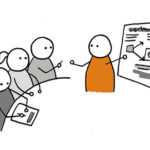 Four types of logic:
Four types of logic:
- Informal logic (logical reasoning) is the study of natural language arguments.
- Formal logic is the study of inference with purely formal content.
- Symbolic logic is the study of symbolic abstractions that capture the formal features of logical inference
- Mathematical logic is an extension of symbolic logic into other areas, in particular to the study of model theory, proof theory, set theory, and recursion theory.
- As well as, Syllogistic logic, Propositional logic (sentential logic), Predicate logic, Modal logic, Philosophical logic, Computational logic.
In counseling, the counselor will make use of the first two, to a point. The first type of logic, on the list, is the main use of logic the counselor will use on a regular basis. When the client presents, the counselor will listen to the person’s arguments and make logical conclusions based on the information provided. The counselor will listen to the things the clients says, how they say them, what the client may be leaving out, and also pays attention to the person’s body language.
Logic helps the counselor to make certain and specific conclusions which may be used to determine the probable root problem, and what steps must be taken to reach a healthy solution. For example, Julie presents that she and her husband, Pedro, have been fighting often lately. She argues that she cannot “put a finger” on what she thinks is the main reason for the constant arguing between themselves. She states that she is frustrated and getting weary of the constant fighting, to the point that she is considering a separation. Logic will help the counselor figure out something that may help resolve, or at least reduce the conflict between these two people.
The counselor may begin by asking certain questions which may help identify the real problem. The counselor must first consider the various possible reasons for the arguing. For example:
- Something may have changed in their life that has caused one or both of them to become unhappy or uncomfortable (the birth of a baby, moved from one home to another, lost a job, that “time of the month,” and so on.).
- One or both of them may be involved emotionally with another person. Even if the person is not sexually involved with another person, and emotional relationship with someone else is still an affair. Adultery (in whatever form) will tend to cause one or both persons in a relationship to start behaving differently from before. When the other person in the relationship begins to notice to difference in the behavior, questions arise. When one person starts questioning the other, arguments can ensue.
- A failure to communicate. Too many people believe that others should just know something because they believe that it is “common sense.” When a person argues that something is “common sense,” they are also placing an obligation on others that they must agree with their opinion. Common sense, is “common” only when all the persons involved agree with the definitions of the words, and understand the expectations as previously described. Many couples, and persons, fight and argue over issues where they believe and expect that others are just supposed to know, understand, and agree with them because what they believe is “common sense.”
- One of them did something that hurt the feelings of the other; this may even be something that was done unintentionally. Accusations of being inconsiderate, not paying attention, selfishness, and so on, usually result when someone unwittingly does something that hurts the feelings of the other. Some people will not confront the offending person due to fear, but will instead allow the anger to build up in them. One of the ways they express their unhappiness is to argue over unimportant things.
These possibilities and others can help the counselor make logical assumptions which may help identify the root problem of the arguing. A counselor may use one of the above possible reasons for the arguing and ask a series of questions which are intended to clarify whether or not that may be the real problem in the relationship. Logic helps a counselor should follow a probable thought to its conclusion, and determine whether or not that may be the real problem.
When using logic, the counselor is looking for three things:
Consistency – Which means that no part of the client’s presentation contradicts another.
Validity – Which means (in the case of Belief Therapy) that the rules of proof require that lies be challenged and then compared to the truth. For example, the client may believe that something is true, because that is the way things have always happened in their lives. Rules of proof would require the counselor to help the client see that those things have not been happening to others, therefore what they believe as truth, is actually just their opinion.
Completeness, of a logical system, which means that if a formula is true, it can be proven (if it is true, it is a theorem of the system).
Soundness, the term soundness has multiple separate meanings, which creates a bit of confusion throughout the literature. Most commonly, soundness refers to logical systems, which means that if some formula can be proven in a system, then it is true in the relevant model/structure (if A is a theorem, it is true). This is the converse of completeness. A distinct, peripheral use of soundness refers to arguments, which means that the premises of a valid argument are true in the actual world.
Logical Reasoning
Deductive reasoning determines whether the truth of a conclusion can be determined for that rule, based solely on the truth of the premises. Example: “When it rains, things outside get wet. The grass is outside, therefore: when it rains, the grass gets wet.”
Inductive reasoning attempts to support a determination of the rule. It hypothesizes a rule after numerous examples are taken to be a conclusion that follows from a precondition in terms of such a rule. Example: “The grass got wet numerous times when it rained, therefore: the grass always gets wet when it rains.” While they may be persuasive, these arguments are not deductively valid. Additional example: “What goes up must come down,” is not always true, because space rockets can go up and not “come down.”
Abductive reasoning, aka inference to the best explanation, selects a cogent set of preconditions. Given a true conclusion and a rule, it attempts to select some possible premises that, if true also, can support the conclusion, though not uniquely. Example: “When it rains, the grass gets wet. The grass is wet. Therefore, it might have rained.” This kind of reasoning can used to develop a hypothesis, which in turn can be tested by additional reasoning or data.
Rules of Logic in Counseling
- Establish a premise. A premise is a possibility that you are allowed to assume.
- Challenge the validity of the premise(s). Compare the parts of the argument with real life application.
- Identify valid conclusions. Clarify specific steps and/or methodology which will directly apply to the premise and produce results which are not only different from the past, but be healthier.






